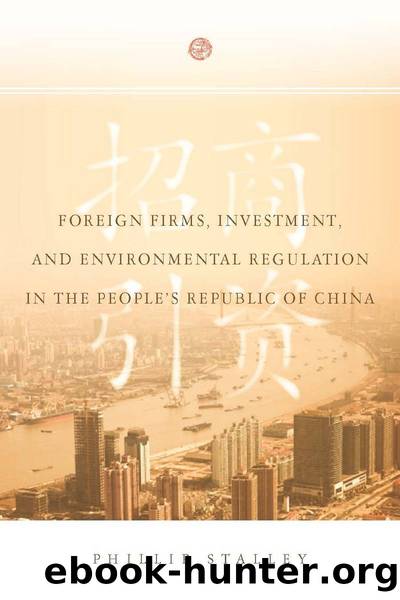Foreign Firms, Investment, and Environmental Regulation in the People's Republic of China by Phillip Stalley

Author:Phillip Stalley [Stalley, Phillip]
Language: eng
Format: epub
Tags: Political Science, Globalization
ISBN: 9780804775144
Google: AyKKqfxU6ZwC
Goodreads: 35191533
Publisher: Stanford University Press
Published: 2010-09-01T00:00:00+00:00
Conclusion
This chapter has shown that, when looking at large chemical MNCs from developed countries, there is little evidence of a firm-induced downward pressure on China's environmental governance. In terms of firm strategy and performance, there is virtually no support for the assertion that foreign firms exert a negative influence on industrial environmental regulation. Multinational companies operate at, if not above, the regulatory requirements of Chinese environmental law. They assist and in some cases pressure domestic partners to improve their own environmental record, and they work with government regulators in a manner that introduces an element of practicality into the implementation of environmental regulation.
Why do MNCs engage in this kind of behavior? Running throughout this chapter is the idea that there is a strong normative element underlying the environmental policies of MNCs. Whether it is keeping an incident register, conducting an EHS audit, or implementing a green supply chain policy, much of foreign-firm behavior is driven by norms and standard operating procedures.74 MNCs do not decide to invest in China and then select an environmental strategy based on location. Rather, their environmental practices are largely dictated by standard corporate policies. Setting up an EHS department, with all the requisite training and policies, is a taken-for-granted element of establishing a new manufacturing operation whether in the United States or in China. It is hardly different from establishing a finance or marketing department; it is just part of doing business. In this sense, then, the behavior of MNCs in China is largely a function of their policies at home.
However, as studies of corporate environmentalism in the developed world have documented, these standard operating procedures have been developed for strategic reasons and are not the simple result of an acute concern with business ethics, the environment, or philanthropy. EHS managers in multinationals recognize that they âdo goodâ and are proud of the work they perform. But from the perspective of the firm as a whole, policies in the environmental realm are little different than in other areasâthey were developed strategically with a strong element of risk management. The EHS policies, with which MNCs comply and push other firms to adopt, have been created to protect the firm's own reputation and the image of the industry as a whole. In some cases, such as lobbying efforts, foreign-firm behavior is also driven by a desire to assure a level playing field and protect material interests vis-Ã vis domestic competitors.
In essence, this shows that there is a certain element of historical learning evident in MNC behavior. In the West, inattention to EHS by chemical companies up to and through the 1980s led to a series of accidents and polluting activities that became costly legal liabilities and stained the image of the entire chemical industry. Firms in the West felt (and perhaps still feel) they were losing their âlicense to operateâ and hence were wary of repeating the same mistake in their foreign operations. As one interviewee mentioned in reference to American firms, even in their China operations, U.S.
Download
This site does not store any files on its server. We only index and link to content provided by other sites. Please contact the content providers to delete copyright contents if any and email us, we'll remove relevant links or contents immediately.
Spell It Out by David Crystal(35854)
Life for Me Ain't Been No Crystal Stair by Susan Sheehan(35539)
Cecilia; Or, Memoirs of an Heiress — Volume 1 by Fanny Burney(32075)
Cecilia; Or, Memoirs of an Heiress — Volume 3 by Fanny Burney(31469)
Cecilia; Or, Memoirs of an Heiress — Volume 2 by Fanny Burney(31419)
The Great Music City by Andrea Baker(30796)
Professional Troublemaker by Luvvie Ajayi Jones(29425)
We're Going to Need More Wine by Gabrielle Union(18641)
Twilight of the Idols With the Antichrist and Ecce Homo by Friedrich Nietzsche(18308)
The Secret History by Donna Tartt(18212)
All the Missing Girls by Megan Miranda(14787)
Cat's cradle by Kurt Vonnegut(14777)
Pimp by Iceberg Slim(13798)
Bombshells: Glamour Girls of a Lifetime by Sullivan Steve(13698)
Fifty Shades Freed by E L James(12925)
Talking to Strangers by Malcolm Gladwell(12888)
Norse Mythology by Gaiman Neil(12861)
The Social Justice Warrior Handbook by Lisa De Pasquale(11957)
Underground: A Human History of the Worlds Beneath Our Feet by Will Hunt(11846)
